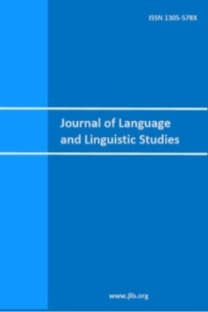An examination of reading strategies awareness among Algerian ESP students at the National Higher School for hydraulics
reading strategies, Algerian ESP students;, SORS; metacognitive awareness; gender; reading
___
Abu-Snoubar, T. (2017). The Metacognitive Reading Strategies Employed by Jordanian English as a Foreign Language Students at Al-Baqa Applied University. Journal of Lietrature, Languages and Linguistics. Vol. 35. www.iiste.org.Amer, A. et al. (2010). Students' Teachers Perceived Use of Online Reading Strategies. International Journal of Education and Development Using Information and Communication Technology (IJEDICT) 6, n° 4, pp :102-113.
Alhaqbani, A. and Riazi, M. (2012). Metacognitive Awareness of Reading Strategy Use in Arabic as a Second Language. Reading in a Foreign Language. Vol. 24 (2). Pp: 231-255.
Alsheikh, N. and Moukhtari, K.(2011). An Examination of Metacognitive Reading Strategies Used by Native Speakers of Arabic When Reading in English and Arabic. English Language Teaching. Vol. 4 (2), pp: 151-160.
Anderson, N. J. (2004). Metacognitive Reading Strategy Awareness of ESL and EFL Learners. The CATESOL Journal. 16 (1). Pp: 11-27.
Benabdallah, A. (2013). Strands in Teaching Reading for Social Sciences: Change and Innovation. English for Specific Purposes World. Vol.14(38).
Bernhardt, E. B. (1991). Reading Development in Second Language: Theoretical, Empirical, and Classroom Perspectives. Norwood, NJ: Ablex Publishing.
Boudaoud, R. (2016). Implementing a Reading Strategy-Based Instruction for Promoting Students’ Achievement and Self-regulation: In Curricular Skill Integration Perspectives: the Case of First Year Students, University of Constantine. Unpublished Doctoral Dissertation. University Mentouri Bros. Constantine
Bouklikha, W. (2016). Practice of the Reading Skill in an ESP Context Using Web-retrieved Materials: The Case of Engineering Students at the University of Tlemcen. Unpublished PhD. Thesis. University of Tlemcen, Algeria.
CORNER, P. (2003). Strategies for Teaching Science Content Reading. The Science Education Review. 2 (4). Pp: 104-119.
Dhieb-Hania, N. (2006). Applying Metacognitive Strategies to Skimming Resaerch Articles in an ESP Context. English Teaching Forum.
Elkouti, M. (2017). The Impact of Text Structure on ESP Learners’ Reading Comprehension: Case Study: Accounting and Finance at the University of Ghardaia. Unpublished PhD. Thesis. University of Ourgla, Algeria.
Flavell, J.H. (1979). Metacognition and Cognitive Monitoring: A New Area of Cognitive-Developmental Inquiry. American Psychologist. 34 (10). Pp: 906-911.
Gaith, G. (2018). English as a Second/Foreign Language Reading Comprehension: A Framework for Curriculum and Instruction. TESL Reporter. 50 (2). Pp: 1-17.
Johns, A. & Dudley-Evans, T., (1991). English for Specific Purposes: International in scope, specific in purpose. TESOL Quarterly, Vol. 25, N° 2, pp: 297-314.
Karbalaei, A. (2010). A Comparison of the Metacognitive Reading Strategies Used by EFL and ESL Readers. The Reading Matrix, 10, (2).
Kachef, S., Damavand, A. and Viyani, A. (2012). Strategy-Based ESP Instruction (SBI) of Reading Comprehension: Male Vs. Female Students. International Journal of Education, Vol.4, N°2.
Kymes, A. (2007). Investigation and Analysis of Online Reading Strategies. USA: Oklahoma State University.
Ladjel, K. and Hamzaoui-Elachachi, H. (2017). Improving Political Sciences Students’ Reading Comprehension of English Texts. The Journal of Teaching English for Specific and Academic Purposes. Vol. 5 (4). Pp: 755-770.
Lamri, C. and Hamzaoui-Elachachi, H. (2018). Developing ELP Students’ Reading Skills through a Blended Learning Approach. Eurasian Journal of Applied Linguistics. Vol. 4 (2). Pp: 389-407.
Malcolm, D. (2009). Reading Strategy Awareness of Arabic Speaking Medical Students Studying in English. System. 37. Pp: 640-651.
Martinez, A. C. (2008). Analysis of ESP University Students’ Reading Strategy Awareness. IBERICA. 15, pp: 165-176.
Mebarki, Z. (2011). Factors Underlying the Reading Performance of Algerian Microbiology Students. International Conference on Education and Educational Psychology. www.sciencedirect.com. Elsevier Ltd.
Mokhtari, K. and Sheory, R. (2002). Measuring ESL Students' Awareness of Reading Strategies. Journal of Developmental Education 25, n° 3. pp: 2-10.
Munsakorn, N. (2012). Awareness of Reading Strategies among EFL Learners at Bankok University. International Journal of Social and Human Sciences. Vol. 6, pp: 497-500.
Oranpattanachai, (2010). Perceived Reading Strategies Used by Thai Pre-engineering Students. ABAC Journal. 30 (2). Pp: 26-42.
Pani, S. (2004). Reading Strategy Instruction through Mental Modelling. ELT Journal V. 58, N°4. Pp: 355-362. Oxford University Press.
Pookcharoen, S. (2009). Metacognitive Online Reading Strategies among Thai EFL University Students. PhD. Dissertation, USA: Indiana University.
Poole, A. (2009). The Reading Strategies Used by Male and Female Colombian University Students. Profile Issues in Teachers’ Professional Development. Profile n°11
Rahimi, A. R. & Talepazan, S. (2012). Exploring EFL Learners’ Reading Comprehension Problems in Reading ESP Texts. Sino-US English Teaching. Vol. 9, N°3, pp: 982-987.
Romly, N. et al. (2017). Metacognitive Online Reading Strategies in Reading Academic Texts among ESL University Students. Conference paper. Retrieved from www.researchgate.net/publication/316273424.
Roohani, A. et al. (2016). Exploring Metacognitive Strategies in Reading Academic Texts among More and Less Proficient EFL University Students. English Language Teaching. Vol. 3(4), pp: 27- 46.
Samimi, F., Sahragard, R. and Ramzjoo, S. (2016). On the Development of a Model of Discipline-specific Reading Strategies in the Context of Iranian EFL Learners. International Journal of Foreign Language Teaching and Research. Vol. 4 (15). Pp: 99-115.
Willaims, M., and Burden. R. (1997). Psychology for Language Teachers. Cambridge: CUP
Zailani, J. and Liza, A. (2015). Online Survey of Reading Strategies (OSORS): Students'Online Reading in Academic Context. Malysian Journal of Distance Education 17, n° 2. pp: 67-81.
- ISSN: 1305-578X
- Yayın Aralığı: Yılda 4 Sayı
- Yayıncı: Hacettepe Üniversitesi
Linguistic and cognitive aspects of translation and interpretation skills
Investigating EFL speakers’ gratitude strategies: Interlanguage pragmatics
Derya BAKIRCI, Ali ŞÜKRÜ ÖZBAY
Being a teacher in the English language-oriented course
Stylistics as a tool for critical language awareness
Lindita TAHİRİ, Nuran MUHAXHERİ
L2 motivational self-system as predictors of out-of-class willingness to communicate
Challenges of translating neologisms comparative study: Human and machine translation
Awadh Nasser Munassar AWADH, Khan Ansarullah SHAFİULL
Turkish tertiary level EFL learners’ recognition of relative clauses
